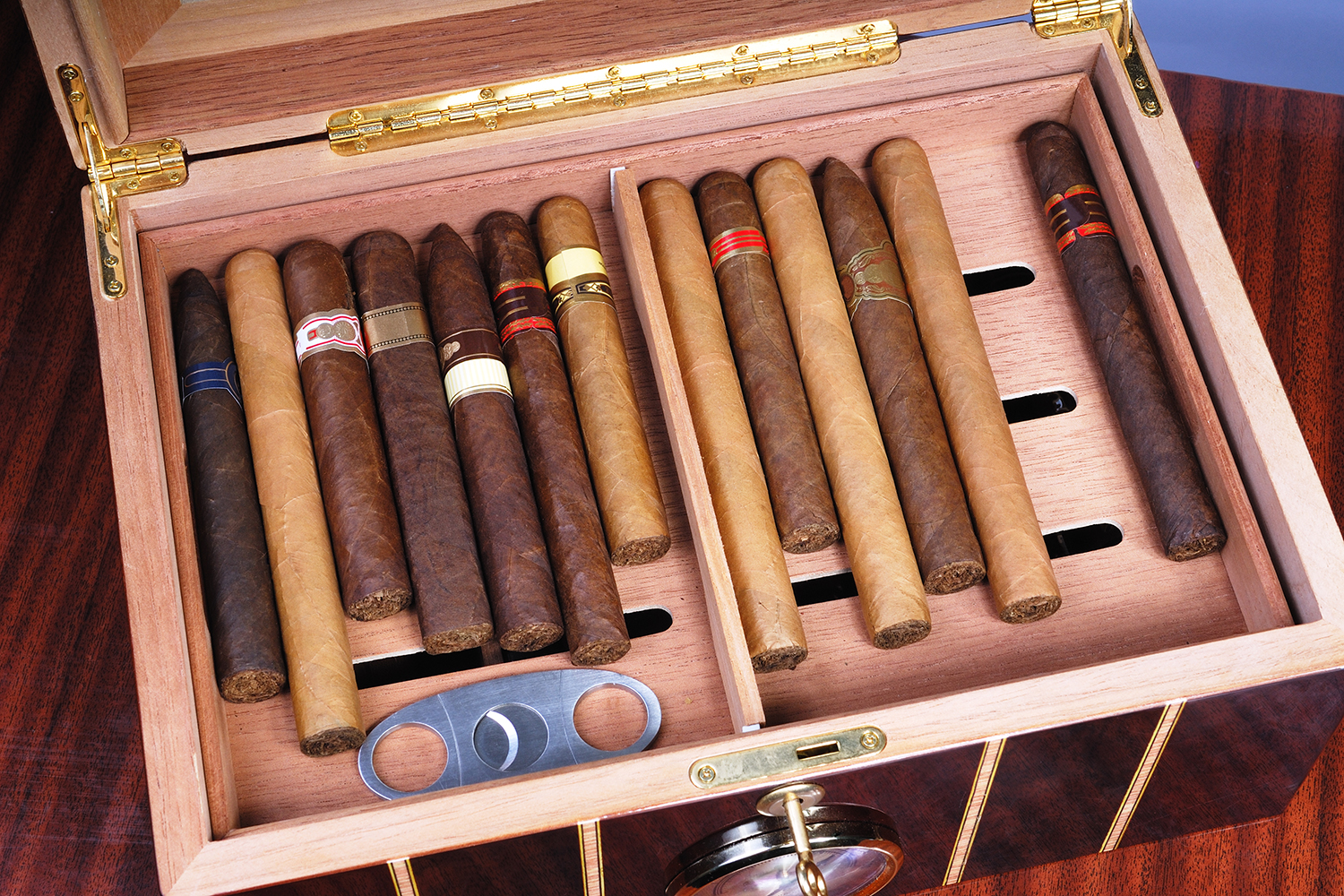Relative Humidity or RH is how you measure the humidity of a space, or in the context of cigars, the level of humidity inside a humidor. You see, cigars must be stored under ideal conditions. The goal is to keep the right amount of humidity or moisture inside the cigar so the tobacco leaves are preserved correctly. This also helps the cigars retain their natural oils which is a big part of what provides flavor while you’re smoking them.
Cigars should be stored inside a humidor, and while they can pretty much last indefinitely while stored properly, some cigars do not age well, meaning you’ll want to smoke them sooner rather than later. But as long as you’re keeping cigars for an extended period they need to be inside a humidor, or some kind of humidified container — tupperdors count, too — with the right humidity. One of the easiest ways to maintain the right humidity inside a container is to use Boveda packs. They come in a variety of RH points from 60% up to 75%.
Of course, that brings us full circle, back to the original question. If Boveda packs come in so many RH options, which is the best for storing cigars?
What is the best humidity for cigars?

You use something called a hygrometer to measure humidity. Analog or older hygrometers . Then again, even some newer and digital hygrometers need to be calibrated. When placed inside the humidor, however, they will tell you the RH or relative humidity.
Many guides recommend an RH level of 70% and list that as the ideal setpoint. That aligns with the 70/70 rule, keeping them at 70% humidity and 70 degrees Fahrenheit. However, not everyone is going to find that setpoint ideal. In fact, many feel that 70% is too humid or too moist.
I like to keep my humidor around 65% humidity. The temperature levels fluctuate depending on what my AC is set at in my home. I don’t ever let temperatures go above 78 degrees Fahrenheit for too long if they ever do. Hey, AC problems in South Florida are no joke.
What’s the ideal RH range?
In reality, enthusiasts and experts would likely recommend keeping the humidity range anywhere from 62% up to 72% — personally, I say keep it below 70%. It’s a matter of preference, and here’s why: The humidity level of the cigar actually affects how it smokes and even how it tastes. A dry cigar burns hot and you won’t taste most of the flavor, meanwhile, a cigar that’s too humidified or too wet will have similar problems.
You want to find the right balance, but more importantly, the right range or setpoint for how you prefer your cigars. Also, most people will store certain types of cigars differently. Cubans, for example, tend to be susceptible to cigar beetles and humidity problems. So, authentic Cubans are stored at lower RH levels — 62% to 65% — and lower temperatures. Some will even purchase a small temperature-controlled humidor to store Cubans, specifically, sort of like a mini fridge. If high temperatures are a concern where you live, that’s not a bad way to store your cigars, period.
Alternatively, some prefer to smoke cigars with more moisture. So, they’ll keep the humidity higher, around the 68% to 72% range. New world cigars — anything non-Cuban shipped in today’s market — can usually be kept at higher humidity levels. That is because manufacturers often treat the tobacco and the cigars when they’re resting to fend off pests and other concerns. Even some retailers, like JR Cigars, will store cigars in a freezer temporarily before adding them to warehouse stock to prevent potential beetle and construction problems.
How do you control humidity in a humidor or tupperdor?

Again, one of the easiest ways is to simply buy a bundle of , or packs from a similar brand and set those inside your humidor, tupperdor, or storage container. Depending on the size of the storage, that’s really all you need to do.
I have a 3500-count cabinet humidor. It’s tall and large, and so stuffing Boveda packs inside would do no good. Instead, I have installed what’s called a . It’s an automated humidification system that intermittently produces moisture and keeps the humidity levels at the right setpoint. Every once in a while I have to refill the reservoir with distilled water and make sure everything is clean. Other than that, it pretty much takes care of itself.
I also have a temperature-controlled humidor in my office, which I use to stow my fussier cigars. Sometimes, you’ll find certain cigars or blends don’t play well in your humidor, because of temperature or RH. That’s how I store my fussy cigars and Cubans. I just have Boveda packs in that humidor.
If your cigars dry out there are some methods to rehydrate and restore them, but honestly, you’re better off tossing cigars when that happens because once they lose too much moisture they’re just not the same.



